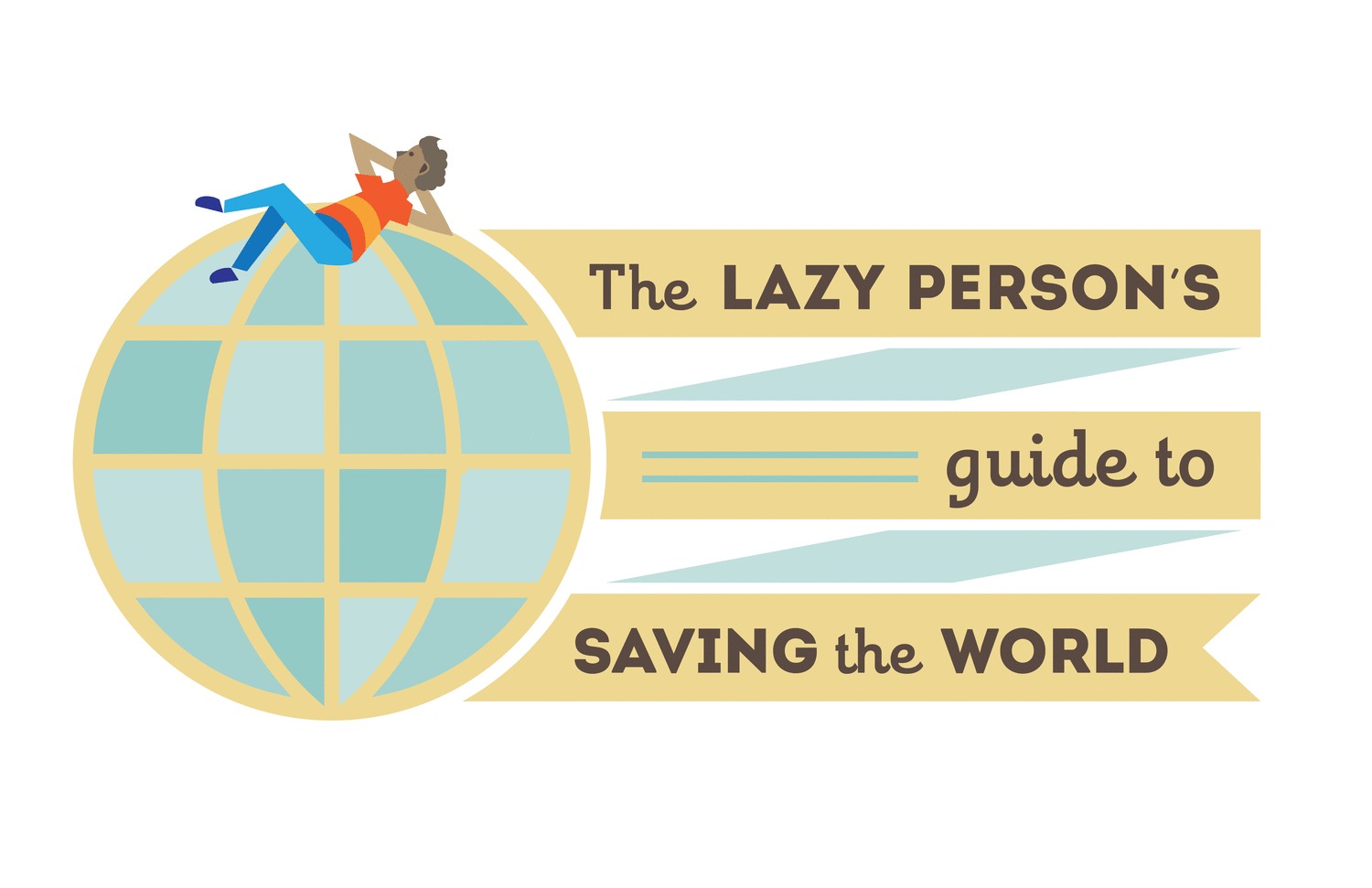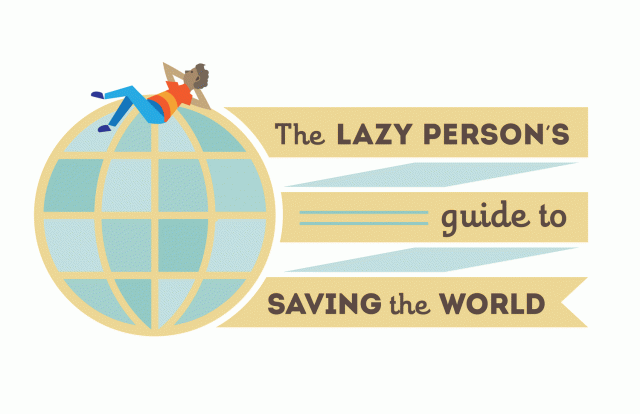End extreme poverty. Fight inequality and injustice. Fix climate change. Whoa. The Sustainable Development Goals are important, world-changing objectives that will require cooperation among governments, international organizations and world leaders. It seems impossible that the average person can make an impact. Should you just give up?
No! Change starts with you. Seriously. Every human on earth—even the most indifferent, laziest person among us—is part of the solution. Fortunately, there are some super easy things we can adopt into our routines that, if we all do it, will make a big difference.
Have a look at just a few of the many things you can do to make an impact!
LEVEL-1
THINGS YOU CAN DO FROM YOUR COUCH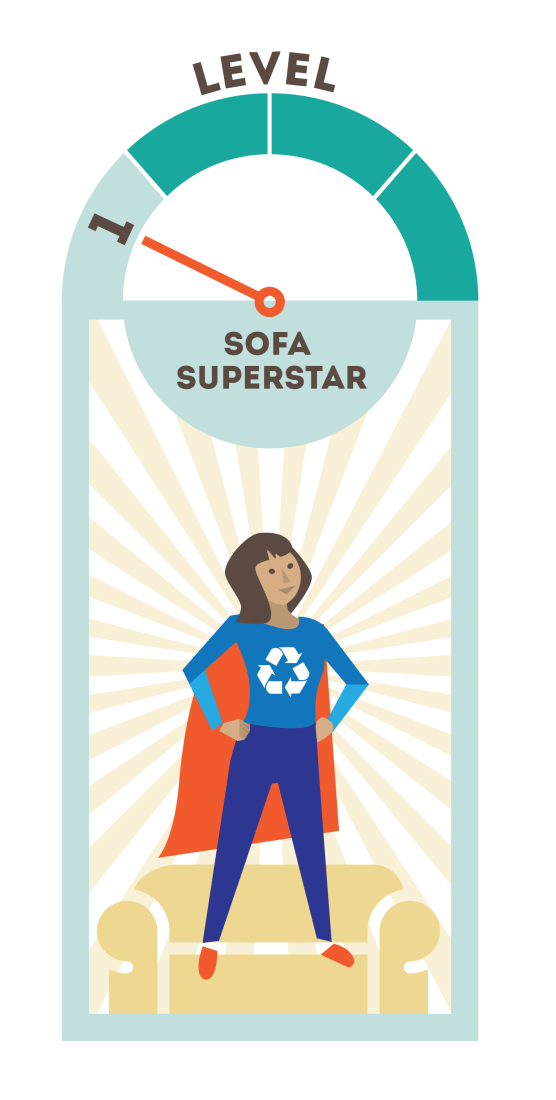
- Save electricity by plugging appliances into a power strip and turning them off completely when not in use, including your computer.
- Stop paper bank statements and pay your bills online or via mobile.
- Share, don’t just like. If you see an interesting social media post about women’s rights or climate change, share it so folks in your network see it too.
- Speak up! Ask your local and national authorities to engage in initiatives that don’t harm people or the planet. You can also voice your support for the Paris Agreement and ask your country to ratify it or sign it if it hasn’t yet.
- Turn off the lights. Your TV or computer screen provides a cosy glow, so turn off other lights if you don’t need them.
- Report online bullies. If you notice harassment on a message board or in a chat room, flag that person.
- Stay informed. Follow your local news and stay in touch with the Global Goals online or on social media at @GlobalGoalsUN.
- Tell us about your actions to achieve the global goals by using the hashtag #globalgoals on social networks.
- In addition to the above, offset your remaining carbon emissions! You can calculate your carbon footprint and purchase climate credits from Climate Neutral Now. In this way, you help reduce global emissions faster!”
LEVEL-2
THINGS YOU CAN DO AT HOME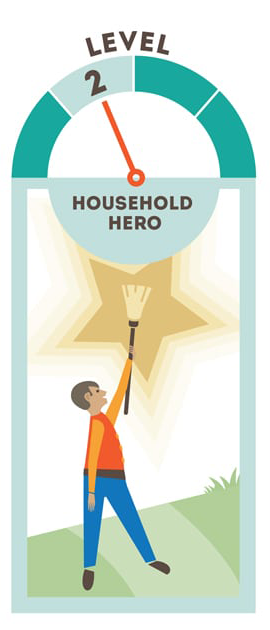
- Air dry. Let your hair and clothes dry naturally instead of running a machine. If you do wash your clothes, make sure the load is full.
- Take short showers. Bathtubs require gallons more water than a 5-10 minute shower.
- Eat less meat, poultry, and fish. More resources are used to provide meat than plants
- Freeze fresh produce and leftovers if you don’t have the chance to eat them before they go bad. You can also do this with take-away or delivered food, if you know you will not feel like eating it the next day. You will save food and money.
- Compost—composting food scraps can reduce climate impact while also recycling nutrients.
- Recycling paper, plastic, glass & aluminium keeps landfills from growing.
- Buy minimally packaged goods.
- Avoid pre-heating the oven. Unless you need a precise baking temperature, start heating your food right when you turn on the oven.
- Plug air leaks in windows and doors to increase energy efficiency
- Adjust your thermostat, lower in winter, higher in summer
- Replace old appliances with energy efficient models and light bulbs
- If you have the option, install solar panels in your house. This will also reduce your electricity bill!
- Get a rug. Carpets and rugs keep your house warm and your thermostat low.
- Don’t rinse. If you use a dishwasher, stop rinsing your plates before you run the machine.
- Choose a better diaper option. Swaddle your baby in cloth diapers or a new, environmentally responsible disposable brand.
- Shovel snow manually. Avoid the noisy, exhaust-churning snow blower and get some exercise.
- Use cardboard matches. They don’t require any petroleum, unlike plastic gas-filled lighters.
LEVEL-3
THINGS YOU CAN DO OUTSIDE YOUR HOUSE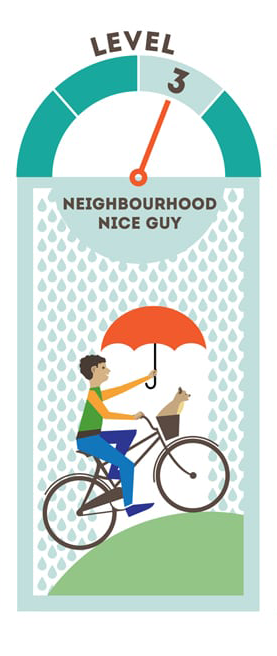
- Shop local. Supporting neighbourhood businesses keeps people employed and helps prevent trucks from driving far distances.
- Shop Smart—plan meals, use shopping lists and avoid impulse buys. Don’t succumb to marketing tricks that lead you to buy more food than you need, particularly for perishable items. Though these may be less expensive per ounce, they can be more expensive overall if much of that food is discarded.
- Buy Funny Fruit—many fruits and vegetables are thrown out because their size, shape, or color are not “right”. Buying these perfectly good funny fruit, at the farmer’s market or elsewhere, utilizes food that might otherwise go to waste.
- When you go to a restaurant and are ordering seafood always ask: “Do you serve sustainable seafood?” Let your favourite businesses know that ocean-friendly seafood is on your shopping list.
- Shop only for sustainable seafood. There are now many apps like this one that will tell you what is safe to consume.
- Bike, walk or take public transport. Save the car trips for when you’ve got a big group.
- Use a refillable water bottle and coffee cup. Cut down on waste and maybe even save money at the coffee shop.
- Bring your own bag when you shop. Pass on the plastic bag and start carrying your own reusable totes.
- Take fewer napkins. You don’t need a handful of napkins to eat your takeout. Take just what you need.
- Shop vintage. Brand-new isn’t necessarily best. See what you can repurpose from second-hand shops.
- Maintain your car. A well-tuned car will emit fewer toxic fumes.
- Donate what you don’t use. Local charities will give your gently used clothes, books and furniture a new life.
- Vaccinate yourself and your kids. Protecting your family from disease also aids public health.
- Take advantage of your right to elect the leaders in your country and local community.
LEVEL-4
THINGS YOU CAN DO AT WORK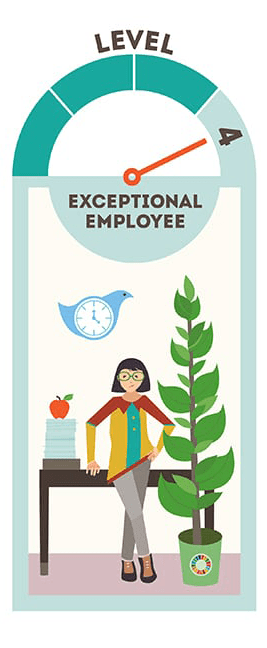
- If you have a fruit or snack that you don’t want, don’t throw it out. Give it away to someone who needs and is asking for help.
- Does everyone at work have access to healthcare? Find out what your rights are to work. Fight against inequality.
- Mentor young people. It’s a thoughtful, inspiring and a powerful way to guide someone towards a better future.
- Women earn 10 to 30 per cent less than men for the same work. Pay inequality persists everywhere. Voice your support for equal pay for equal work.
- 4 billion people lack access to basic sanitation services. Lend your voice to talk about the lack of toilets in many communities around the world!
- Make sure your company uses energy efficient heating and cooling technology, and adjust the thermostat, lower in winter, higher in summer.
- Stay informed. Read about workers in other countries and business practices. Talk to your colleagues about these issues.
- Does your company invest in clean and resilient infrastructure? It’s the only way to keep workers safe and protect the environment.
- Raise your voice against any type of discrimination in your office. Everyone is equal regardless of their gender, race, sexual orientation, social background and physical abilities.
- Bike, walk or take public transport to work. Save the car trips for when you’ve got a big group.
- Organize a No Impact Week at work. Learn to live more sustainably for at least a week: un.org/sustainabledevelopment/be-the-change.
- Speak up! Ask your company and Government to engage in initiatives that will not harm people or the planet. Voice your support for Paris Agreement!
- Try to reduce waste, since most waste ends up in our oceans.
- Examine and change everyday decisions. Can you recycle at your workplace? Is your company buying from merchants engaging in harmful ecological practices?
- Know your workplace rights to ensure your access to justice.
- Corporate social responsibility counts! Encourage your company to work with civil society and find ways to help local communities achieve the goals.
Click here for a PDF download of some of the actions.
